John Janaro's Blog, page 91
September 1, 2021
"Nurture in Us What is Good..."
The Collect prayer in the liturgy this week is another of those apparently simple that we might easily miss, but which is in fact profound in its encompassing of the foundations of our journey through this life.
It is good to “take time” with the these prayers of the Church, to dwell on them and “with them,” to let our hearts be formed by them.

August 31, 2021
Finding Memories of My Parents in the Blog

**********************************************************************************************************************************************************
Dad and Mom were my two most faithful readers. I often thought of them when I wrote or posted pictures over the years. Even though I did not "succeed" in many of the ways I had aspired to in my life, they always encouraged me and appreciated whatever I managed to accomplish. It was a wonderful thing to have such affirmation from one's parents. It turned out to be something I really needed, in the circumstances I faced - but ultimately it was a gift for which I can only be grateful.
So they read the blog faithfully... but it wasn't just for my sake.😉
If you go back ten years in this blog, you'll find a lot more funny stories about "the kids." You'll also find plenty of "JJ-pondering-things" too. Themes and ideas in this latter regard were not much different than they are now. But the life of the Janaro family was totally different in 2011.
The house was full of kids who really were kids (John Paul was getting ready to begin his Freshman year of High School), and my parents also came to visit us sometimes (as well as our making weekend visits to "Papa-and-Grandma's" place in Arlington). They were "only" in their 70s back then, and they were still pretty "vigorous" (well, my mother was never very vigorous physically but her mind was prodigiously active, and my Dad had just retired from his full time job two years earlier - he worked from age 18 to 74, but he seemed to be doing well with his new schedule - serving on the Condo board, helping my mother, and doing plenty of reading).
We think that "the years go by so quickly," and yet when we stop to think about all the life we have lived, it becomes clear that 2011 was a long time ago.
What a decade it has been! I never would have imagined the details of the way things would happen and how they would affect our lives. Yet we have passed through (in a inimitably particular and personal manner) a perennial "season of life" such as humans have experienced for countless generations prior to ours, and will continue to experience in future generations.
Clearly, I was aware a decade ago of the "basic form" of what awaited us "in the future." Recently, while updated my downloaded backup of this blog (in PDF form), I came across this article from April 2011, on the occasion of Dad's 76th birthday. (Back then, my posts often did not include pictures, which is hard for me to believe given my interest and involvement with photography and graphics and digital art now.)
It seems appropriate to conclude these eventful Summer months by reproducing below the article from April 8, 2011, in which I talk about my parents and wonder about the times to come:

August 29, 2021
Lucia Turns 21 Years Old
August 28 was Lucia Janaro's 21st birthday, but we spread the celebration out all weekend. A happy time for the whole family!🎉🍾🎂🍼 We love you, Lucia!❤️🌟🙂

August 28, 2021
The Profoundly Personal Conversion of Saint Augustine
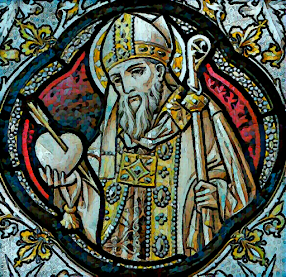 August 28 is the day on which we celebrate the feast of Saint Augustine, the fourth century bishop and greatest of the Latin Church Fathers. The story of Augustine’s conversion as a young man is one of the most famous in the history of Christianity, and indeed in the history of Western humanities and literature, thanks to the penetrating account of it that he gives in his epoch marking autobiographical work, the Confessions.
August 28 is the day on which we celebrate the feast of Saint Augustine, the fourth century bishop and greatest of the Latin Church Fathers. The story of Augustine’s conversion as a young man is one of the most famous in the history of Christianity, and indeed in the history of Western humanities and literature, thanks to the penetrating account of it that he gives in his epoch marking autobiographical work, the Confessions.Augustine was born in Roman North Africa in 354, during a period of transition and religious instability that saw the rise of the recently legalized Christianity even as it struggled with the great heresy of the Arians, various gnostic groups and oriental mystery religions, and the prevailing decadence of the pagan social milieu.
As a young man, Augustine went to study at the cultural center of Carthage, where he was introduced to the "sophisticated" lifestyle of wealthy urban pagans in late antiquity - with all its self-indulgence, superstitions, and fanciful cosmological and religious speculations. He took a concubine and embraced the Manichean sect, while also sharpening his mental and rhetorical skills. Eventually he traveled to Rome and Milan, abandoned the intellectually weak Manichean system, and dedicated himself to a genuine pursuit of truth through philosophy. Soon he found himself grappling with the claims of Christianity as his aesthetic and intellectual objections to it were overcome. What remained was the need for a conversion of heart, which came finally in the famous reading of Romans 13 in the garden in Milan (Confessions VIII.12).
The story of Augustine could be understood as an intellectual and moral journey, and these are certainly crucial elements. But its important, also, to emphasize the personal communication that pervades his whole experience of conversion. The Confessions make this clear by their genre; they are written as a prayer to God, and this is clearly more than a literary device. Augustine makes it clear that God’s grace and mercy, given through the Church, is the profound source and focus of his conversion. He learns that philosophy is not enough; that truth and salvation are constituted by a personal relationship with Christ, the Truth in person.
We see this too in the crucial role that the companionship of particular Christians plays in Augustine’s life. They bring the Church close to him in a way that opens him up and enables him to overcome his objections of mind and heart. The key person, of course, is his mother Saint Monica. Her maternal love and her constant, ardent prayers for his conversion were a continual witness to him through all his wanderings. And she joyfully received the news moments after grace finally won over her son’s heart.Also of great importance is Saint Ambrose, who received him with fatherly kindness when he first came to Milan, and by cultivating his friendship and trust, drew him to attend his sermons. Augustine’s admiration for the beauty of their style soon grew into an attraction to the radiance of the truth they imparted. He would eventually be baptized by Saint Ambrose on Easter 387. “To him was I unknowingly led by You, that by him I might knowingly be led to You“ (Confessions V.13).
The world honors Saint Augustine as a founder of Christian philosophy and the great prose writer of late antiquity. But Christians know that he was above all a Christian person, transformed by the love of God that reached him through human instruments: the prayers of Saint Monica, the guidance and friendship of Saint Ambrose. They helped him to discover that Truth has a human face.
August 27, 2021
August is Full of Heat, Greenery, and Thunderstorms
Here are recent outside photos, some of which have artistic thematic development or graphic tools augmentation. Thunderstorms have been loud and frequent, but they have brought welcome cool air late in the afternoon.



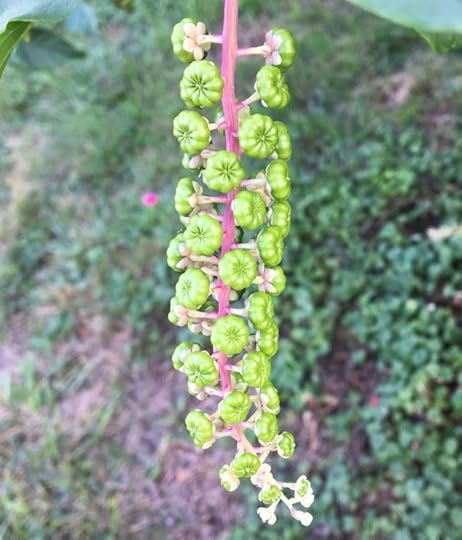

August 25, 2021
"How is JJ Doing These Days"?
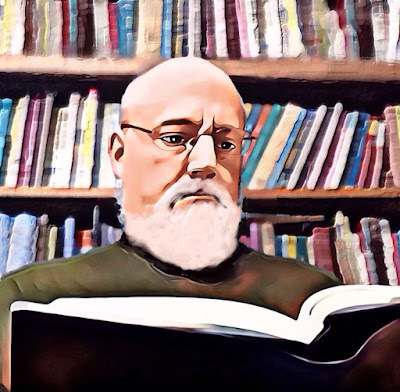 If you ever read this blog, you might be wondering, "How is JJ doing these days?"
If you ever read this blog, you might be wondering, "How is JJ doing these days?"When it comes to my physical and mental health and my overall emotional state, I guess all I can say about myself in these times of so many personal and familial changes is: "I don't know."
"How am I 'doing' after this Summer, and indeed after a year and a half sharing with everyone else the common stresses and strangeness of the COVID pandemic?" Well, generally speaking, I'm no worse off than anyone else in the "First World." I have had my fair share of human uncertainties and worries about my own and my family's health and security in these months. We who live in the world's "rich countries" are being confronted - in a particularly persistent fashion - with the fact that no amount of wealth and power (nor even the now-abundant access to apparently effective preventive resources and treatments for this new disease) can solve the overarching "problem" of our own radical fragility, our susceptibility to suffering in ways beyond our control, and all the inevitable emotions entailed by this vulnerability that we have become accustomed to forgetting about while living lives of wildly unprecedented material prosperity.
I say "WE" here, not as a rhetorical contrivance, but because I too need to be shaken out of my own illusions of the "collective self-sufficiency" and omni-competence of the technologically advanced society I live in. I am grateful, of course, for the progress we are making in the fight against COVID, and I hope we will share our resources with the poorer places in the world, out of a sense of human solidarity, fraternal love, justice and equity, and respect for human dignity. This will draw us closer together as brothers and sisters who love and care for one another, who treat one another with mercy and compassion.
Nevertheless, even in the best case scenario, no medical advances will ever "overcome" the fundamental human drama (the mystery) of living within time, within limits, living with suffering, incapacity, loss, and death.
This may all seem like a tangent diverting far from your question ("How are you, JJ?"), but it's actually all tied together because this is how my brain works. I'm always thinking (over-thinking) about everything, finding the connections between my problems and the problems of the world, searching for the bigger context, trying to understand, and worrying because I can't figure out how to fix everything. (Well, I worry less than I used to....)
Nothing new about me living with my "beautiful mind" (and you can read more about that in my 2010 book - which can be ordered by clicking HERE - or in numerous previous posts about mental illness and mental health ranging over the past ten years of this blog - click HERE to see some of those).
My emotions are still all over the place. We are making the slow inventory of my parents' possessions. So many things - large and small - they had since the earliest days I can remember, from furniture (which they used all my life and in three different residences) to boxes and business cards and jewelry and all sorts of little accessories. The smallest object, such as a pin, can suddenly stir up a vivid - almost tangible - memory from over forty years ago. There are so many memories that I don't even know I still have, and even when they are "bittersweet" it seems that eventually the weight tips more to the "sweet" side, from which we receive an unexpected sustenance. This must be why people give useless gifts to one another, why things are cherished as souvenirs, "keepsakes," and - eventually - heirlooms.
What kind of people are we becoming, who consume or use-and-discard such huge quantities of material things without a thought? It's more than "wasteful." We lack memory. We are constantly distracted and afraid of commitment. But it's a hard world to live in, where our constantly increasing power pushes and pulls us relentlessly like a raging river flooding its banks, carrying us ever faster without our having any idea where we want to be or hope to go. Life is more disorienting and traumatic in many ways today. But it's still worth living in a human way, building fruitful, committed relationships with one another, and living with a sense of purpose that is worthy of our humanity even as we face new challenges, so as to pass on to the new generations a richness of awareness that will prepare them to meet the unprecedented challenges of the future.
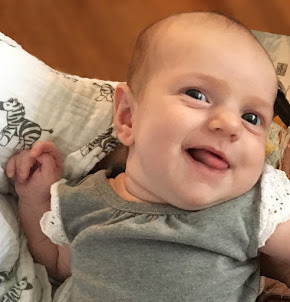 That reminds me: Maria is sleeping in the same crib her father and his sisters slept in as babies. There are probably fancier cribs available today but this one is pretty good. It's safe, sturdy, useful enough... It certainly has gotten a lot of use, and it has a lot of memories attached to it. Now, with Maria, those memories stretch forth new branches, new hopes.
That reminds me: Maria is sleeping in the same crib her father and his sisters slept in as babies. There are probably fancier cribs available today but this one is pretty good. It's safe, sturdy, useful enough... It certainly has gotten a lot of use, and it has a lot of memories attached to it. Now, with Maria, those memories stretch forth new branches, new hopes.So, how am I? Do you think I'm trying to evade the question? I'm not; I'm just rambling about it a bit, because it's a question that intersects with many things.
I am full of gratitude and hope (really), which coexist with lots of feelings of different kinds, some of which are part of a long-standing psycho-pathology that I will never entirely eradicate, and that I will always have to attend to "day-by-day" (again, see those links above to read more about these particular problems).
I also get anxious and depressed in more conventional ways about the things that trouble us all, and I wring my hands about "this-crazy-world-we-live-in" (and which Maria and [God willing] our other future grandchildren will have to grow up in and live in long after our time is complete😳).
It has been hard seeing my parents die in the last two years. I was very close to both of them, and they were with us for a long time. I'm so grateful we had them nearby, and that our kids grew up knowing them. My heart goes out to so many people who have lost their parents in tragic circumstances, or while they were still young.💔 I cannot imagine how hard that must be. I feel a little silly referring to my own grief, which in any case is not complicated by any special trauma or catastrophe.
Really, I don't understand grief. It's a strange experience, which I "notice" in different forms but can't really analyse in a coherent way. I miss Dad and Mom, but I also don't feel "too far removed" from them. In this regard, faith in Jesus and our continued common belonging to the communion of His Church are a true source of consolation and sustenance.
Meanwhile, Maria has burst into our lives and brought us lots of joy. I hope to write more about being a grandfather in future posts. (There will at least be pictures.)
I have aches and pains, but I manage. I get tired very easily, still. I miss my usual walks. July and August are just too humid for me to get around much outside. But I have plenty of books at home, and tools for creative expression. Regarding the latter: even if my rather undisciplined artistic explorations amount to nothing worthwhile, I feel the need to work in this aesthetic manner, like I used to feel it when I was a child. Though I find it to be absorbing and fascinating activity, I don't worry about it too much.
September is coming soon, with cooler weather. As I grow older, I find that I am more inspired and more at peace with the splendors of Autumn. They are awesome yet gentle, and in my part of the world they linger graciously and have time enough to tell us their own special secrets.
August 23, 2021
Recognizing God in the Humanity of Jesus
God is not found in dreams of grandeur and power, but in the humanity of Jesus, and in our brothers and sisters, especially those in need.
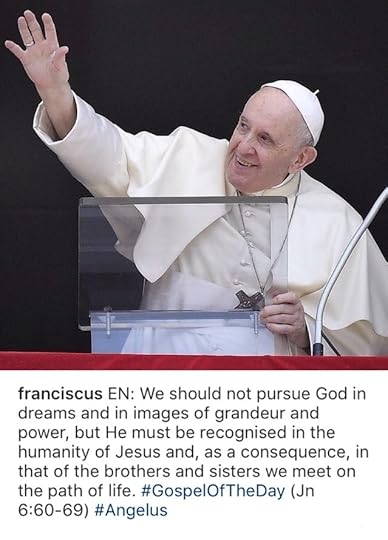

August 22, 2021
Everybody Wants Love. But What IS "Love"?
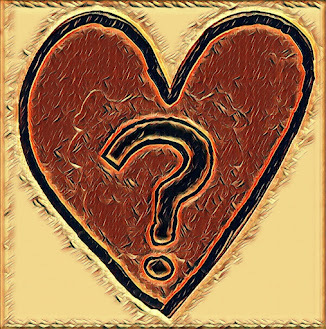 Love.
Love.It's an amazing thing, this impetus and need we call "love" that boils so deep inside everyone of us and that provokes us so inescapably.
We want love, we long for love, we fight over love, we resent the lack of love, we try to render ourselves immune to the pain and the risk of love...
Love: it is engraved on the heart; it constitutes our identity, and yet we don't even know what it is.
We are fooled by so many cheap deceptions that pose as love. We are ready to run to anything that promises "love," only to be disappointed again and again. Too often we abuse one another and provoke violence and atrocities, all the while claiming that we are doing these things "for love." Clearly, something has gone terribly wrong in our perception of what "love" is all about.
Often we use the word "love" as a synonym for a phrase that indicates something-I-really-WANT or something-that-makes-me-feel-really-good. This is only part of the whole dynamic of love. The real goal of our "wanting" is far greater than the limits of objects we use or feelings we perceive (which are not enough to satisfy us and ultimately point beyond themselves). In our lives we experience a fundamental intuitive sense that we are "called to love" - that the meaning of our existence is realized in an ecstasy of self-giving and receiving, of reciprocal interpersonal belonging - which, moreover, is founded on something Greater, on an original and sustaining gratuitous Gift.
We want to love, because in the depths of our being we recognize the basic fact that we are already loved. We are radically given to ourselves and to one another by an original Someone who "holds us all" in a transcendent mysterious love: all-encompassing yet intimately personal to each of us; invisible, ungraspable, yet real - the Source of our own reality - and entirely worthy of our trust.
Therefore, we are made for love. But we fail to trust in the Mystery who makes us, we lose perspective on reality, and our efforts to love degenerate into grasping at the world and reducing persons and things to our own measure. Without radical trust in the One who loves us, we try to make ourselves into the "guarantee" of the value of our own existence by dominating others (and we fear the power of others to crush us and deprive us of our value and personal dignity). Our "love" does not know how to receive and give, and so it becomes a project to take and manipulate, to crave and covet what we think we want and to hoard and devour what we think we "possess." We're all messed up regarding what it means to love and how to realize this basic facet of our humanity. Not surprisingly, this is reflected in all the dangers and crises and dysfunctional relationships and social problems of the world we live in.
Nevertheless, it remains possible to love and be loved in this life. It is necessary to our humanity. And by living in authentic relationships with commitment and fidelity to other people - wherein we receive and give love, sacrifice ourselves for one another, collaborate in common endeavors, and look at one another with compassion, forgiveness, and mercy - we can experience and grow in the reality of true love.
Even still, it remains a mystery.
Ultimately, it is a mystery because love is at the core of our being-in-the-image-of-God. The human person is made in the image of the Infinite Mystery that that transcends all things, that brings all things into existence, sustains them in the fragility of their finite being, and guides them sweetly to their fulfillment - with the unsearchably vast and at the same time attentive tenderness and intimacy of ultimate wisdom and love.
We are made in the Image of God! We have an ineradicable dignity, a sense of purpose and responsibility, and the freedom to affirm and live our true identity.
Don't get down on yourself, ever! You are not worthless! You are worthy of love. And you are capable of love. The experience of love and the practice of loving are possible in every circumstance: in the family, at school or work, in play and recreation, in the self-giving of creativity, in helping others in a multitude of ways, and even in all the "little, inconsequential things" - the apparently superficial interactions we have with people all the time.
Love is also possible in times of darkness, amidst life's great burdens: in difficulties patiently borne, in the midst of confusion and upheaval, in the loneliness that can be such a great invisible suffering, in every kind of sickness, incapacity, sorrow, or grief. These things reveal to us our fragility and poverty, and we may feel that we cannot love because we have nothing to give. But this not true, because in these times especially God loves us and is close to us. He is at work within us to transfigure our poverty into more profound ways of loving.
Finally, and perhaps harder to believe than any of the others, love is possible even in the intolerable dullness, boredom, and frustration, the apparently paltry and flawed accomplishments, and all the undignified failures and mistakes of an ordinary day. Here, where so much of our life is lived, God is surely present. Here, He secretly invites us to embrace the mystery of His ineffable plan wherein He is accomplishing the all-encompassing victory of love.
We must be confident that "Love will 'win'." (I am certain that this triumph of God's love has already been radically achieved and is working in the depths of human history and the heart of every human person, because my own life - incoherent though it may be - has been taken hold of by the love of Jesus Christ, who is the definitive revelation and accomplishment of God's love not only for me but for everyone. That is why I am "compelled" to profess the name of Jesus. "God so loved the world that He gave His only-Begotten Son, so that whoever believes in Him might not perish, but have eternal life" [John 3:16]. Whether I mention Him explicitly or not, all my hope for any goodness in the world, any recognition of human dignity, any value to what I accomplish with my work, is rooted in the joy of knowing the love of Jesus and the promise of the fulfillment of all things in Him.)
Love is at the heart of all life. We must never give up and turn to cynicism or discouragement because of the strange ways and apparent absences of love, or because of our impatience with the arduous and seemingly distant fulfillment that the vocation to love often entails. We are destined to grow through this life in ways beyond our imagining. We must sacrifice and persevere, because the fulfillment of love is so much greater than our hearts and our own measure. But it's worth it. It's what we are made for!
Love is real. So do not let yourself be cheated. God created you in His image. And God is not a void of ultimate loneliness. God is Love. God is communion. In an infinite and transcendent way - yet in a way that wholly penetrates and constitutes our being, awakens our aspirations, and sustains our hope - God is the "eternal embrace" that we all long to give and receive in love.
God calls us to love Him and to love one another "in Him," to be His children, and to realize the purpose of our lives by sharing forever in His embrace - the inexhaustible gift and fulfillment of Infinite Love.
August 20, 2021
Saint Bernard and God’s Love
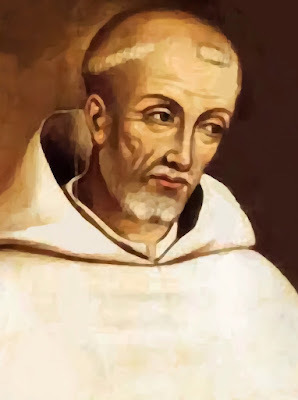 Happy Feast of Saint Bernard of Clairvaux (1090-1153), the great Cistercian monastic reformer, the counselor of kings and popes, the wise and prolific “mellifluous doctor” of biblical theology, and above all the mystic, the contemplative who waited on the Lord, the tireless lover of God. (Texts from Saint Bernard below are in bold font.)
Happy Feast of Saint Bernard of Clairvaux (1090-1153), the great Cistercian monastic reformer, the counselor of kings and popes, the wise and prolific “mellifluous doctor” of biblical theology, and above all the mystic, the contemplative who waited on the Lord, the tireless lover of God. (Texts from Saint Bernard below are in bold font.)"For when God loves, all He desires is to be loved in return; the sole purpose of His love is to be loved, in the knowledge that those who love Him are made happy by their love of Him."
God loved us in creating us, and when we went astray in our own sins and in the narrowness of our self-destructive will to dominate one another, He loved us immeasurably more by coming to dwell with us, die for us, and restore us to His love.
"In the first creation He gave me myself; but in His new creation He gave me Himself, and by that gift restored to me the self that I had lost.
"God deserves exceeding love from us, a love that has no measure… The reason is that He was first to love. He who is so great loves us so much; He loves us freely, little and poor as we are.
"That is why I said there should be no measure of our love for God. For since love given to God is given to the Infinite and Measureless, what measure or what limit could it have? He, the Unmeasured and Eternal God, He who is Love beyond all human knowledge, whose greatness knows no bounds, whose wisdom has no end, loves.
"Shall we then set a limit to our love for Him?
"I will love you, O Lord my strength, my rock, and my defense, my Savior, my one desire and love. My God, my helper, I will love you with all the power you have given me; not worthily, for that can never be, but to my full capacity. Do what I will, I never can discharge my debt to you, and I can love you only according to the power that you have given me. But l will love you more and more, as you see fit to give further power" (texts from the Treatise On The Love Of God).
August 19, 2021
Using "Media" to Share Our Humanity
YouTube was (and remains) a pioneer in the new realm of accessible audiovisual communications media. Though the content varies greatly, it has long included the possibility of "everyone having their own T.V. station" or broadcasting platform.
I use my YouTube channel for the occasional "vlog" which can be posted elsewhere and conveniently linked here. I decided to use the video below to continue the theme of yesterday's blog post. Notwithstanding the "general" thematic title (Using Media to Share Our Humanity), the content is primarily personal, reflective, and - I hope - encouraging:



